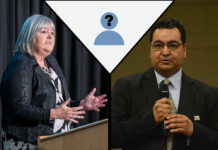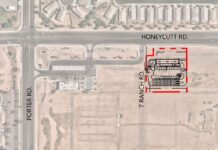Submitted by Rep. Mark Finchem

On Aug. 15, a news release was circulated by the City of Maricopa that claimed, “The Arizona Legislature Increased your Taxes,” going on to say, “the Arizona Legislature passed and the Governor signed Senate Bill 1529, which significantly changed school funding in selected districts across the state.” At least the press release got that part right, but a significant element of the truth was conspicuously missing.
For decades school districts have received “Desegregation supplemental funding” from both local property taxes (by way of the Primary Property Tax) and from the State General Fund. SB 1529, moved the desegregation supplemental funding from the Primary Property Tax load, to the Secondary Property Tax load, making those school districts who have been collecting Desegregation supplemental funding from the state, accountable for the use of the money to school district residents affected.
When the Legislature first began supplementing local school districts with gap-funding it was an arrangement to ease the strain on local budgets caused by the taxpayer approved 1 percent Property Tax Cap, and the arrangement was to be temporary. Over the years, the urgency to solve segregation was replaced with a sense of entitlement continuation, even though the money was intended to end segregation. In the case of MUSD, the only reason the State has funded desegregation is to address Maricopa’s property tax collection, that is over the 1 percent tax cap. Those school districts that are not over the 1 percent Property Tax Cap, and are under an OCR order to desegregate have never received money from the State, (Phoenix Union is an example). This a problem because the Pinal County and City of Maricopa governmental bodies have made it a problem with their spending habits.
During the 2016 Legislative Session, LD-11 Representatives Vince Leach and Mark Finchem asked about questions generated by the State Auditor General posed to then MUSD School Superintendent Steve Chestnut, “Where is $1,000,000 annually sent to MUSD going; what are you spending it on since after all of these years you have not achieved ‘unitary status’ (desegregation?” His response was short and illustrative of the condition of financial management in many school districts. He simply said, “I don’t know.” In fact, the Superintendent had to check with the Office of Civil Rights to find out how the money was supposed to be spent.
If desegregation has not ended, one is left to ask the tough question, why not? Is it a lack of political will? Or is it that desegregation has been achieved, but the school districts want to keep the tap open and taxpayer money flowing without accountability?
The News Release [also] claims, “The State Legislature passed a law that instituted a secondary property tax without putting it to a vote of those affected, which we believe is illegal and unconstitutional.” This is not a new tax, it is a tax moved from on funding source to another, putting the responsibility for funding on the community that uses the school system, and not other communities that do not have a segregation compliance problem with the U.S. Department of Justice (DOJ), Office of Civil Rights (OCR).
The truth is that with SB 1529, Arizona’s poorer, rural counties are no longer be asked to pay for the inability of allegedly segregated school districts to achieve desegregation, called “unitary status’ by the DOJ, OCR. It is important to emphasize, the money has been set aside for the highly specific purpose of desegregation. And while the News Release claims, “The responsibility for this new tax lies with the State Legislature and the Governor,” the real responsibility lies with the body that spends the money, not with the one that provides the funding.
The salient question for the residents of the City of Maricopa to ask is, “Why has MUSD desegregation not been achieved, is it because of a lack of political will to make the changes needed to desegregate?” Could it be that desegregation has already been achieved and the money is now redirected to another use? Or is it just shear incompetence on behalf of those who are supposed to be stewards of the public funds?
SB 1529 has corrected an inequity, namely taxation without representation. Arizona City residents don’t want to pay MUSD taxes for desegregation when they have precious few dollars for their own children education. It is indeed curious that the Board of Supervisors should have been told by their staff that not all the Desegregation Districts have a 1-percent cap tax problem, and that no state money flows to them thru the supplement, but only to those districts that are evading the vote of the voters that came from SB 1080, a vote to limit taxation on property to 1 percent.
Might it have something to do with the county rate of 3.75 percent (among the highest in the state) and the City of Maricopa at 5 percent (very high if not the highest city rate), leaving only 1.25 percent for CAC and MUSD to fight over? We, of course, know they don’t–so all collectively go over the 1 percent cap-leaving the shortage for the rest of the state taxpayers to make up. And the State gets the blame because local taxing jurisdictions can’t or won’t curtail spending?
The time has come for residents of the district to hold their locally elected school board officials, City and even County elected officials accountable for what they are doing with the tax dollars that they have been entrusted with.
Additional information can be found at http://www.arizonatax.org/sites/default/files/publications/position_papers/deseg_handout_1.pdf
Mark Finchem, a Republican, represents LD 11 in the Arizona House of Representatives.


![Elena Trails releases home renderings An image of one of 56 elevation renderings submitted to Maricopa's planning department for the Elena Trails subdivison. The developer plans to construct 14 different floor plans, with four elevation styles per plan. [City of Maricopa]](https://www.inmaricopa.com/wp-content/uploads/2024/04/city-041724-elena-trails-rendering-218x150.jpg)
![Affordable apartments planned near ‘Restaurant Row’ A blue square highlights the area of the proposed affordable housing development and "Restaurant Row" sitting south of city hall and the Maricopa Police Department. Preliminary architectural drawings were not yet available. [City of Maricopa]](https://www.inmaricopa.com/wp-content/uploads/2024/04/041724-affordable-housing-project-restaurant-row-218x150.jpg)

![City looks to lower property taxes again City Manager Ben Bitter speaks during a Chamber of Commerce event at Global Water Resources on April 11, 2024. Bitter discussed the current state of economic development in Maricopa, as well as hinting at lowering property tax rates again. [Monica D. Spencer]](https://www.inmaricopa.com/wp-content/uploads/2024/04/spencer-041124-ben-bitter-chamber-property-taxes-web-218x150.jpg)











![Who’s the Best Mom InMaricopa? Nominate now! Marlene Marshall, Christina Olivares, and Meghan Bremer. [Bryan Mordt]](https://www.inmaricopa.com/wp-content/uploads/2023/05/BCM_8465-100x70.jpg)